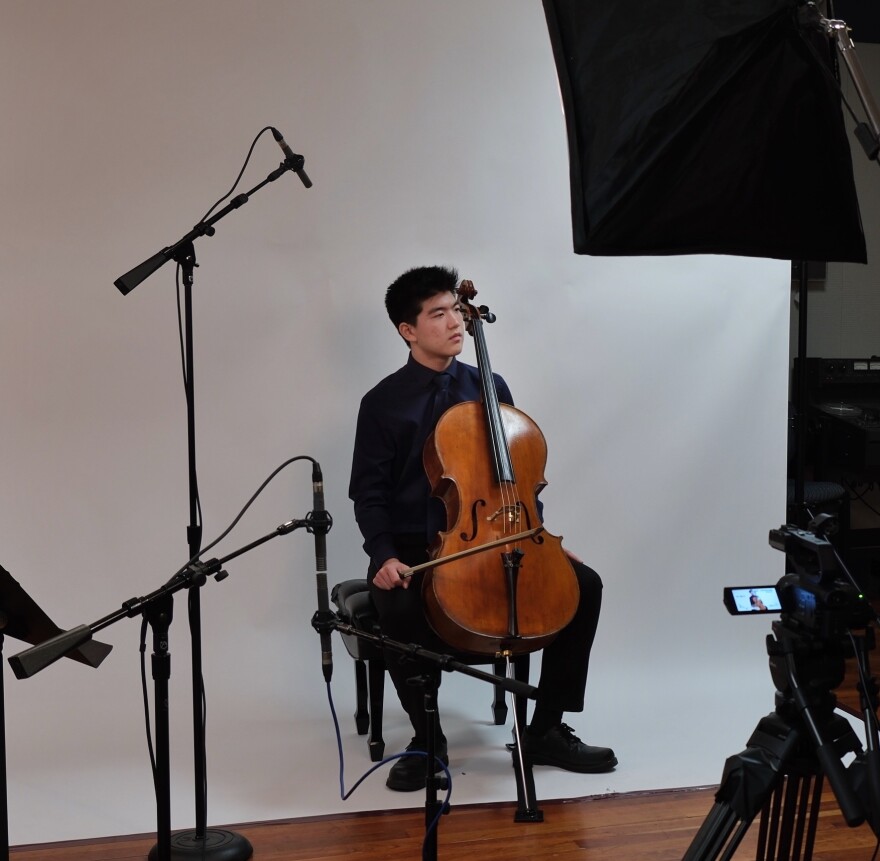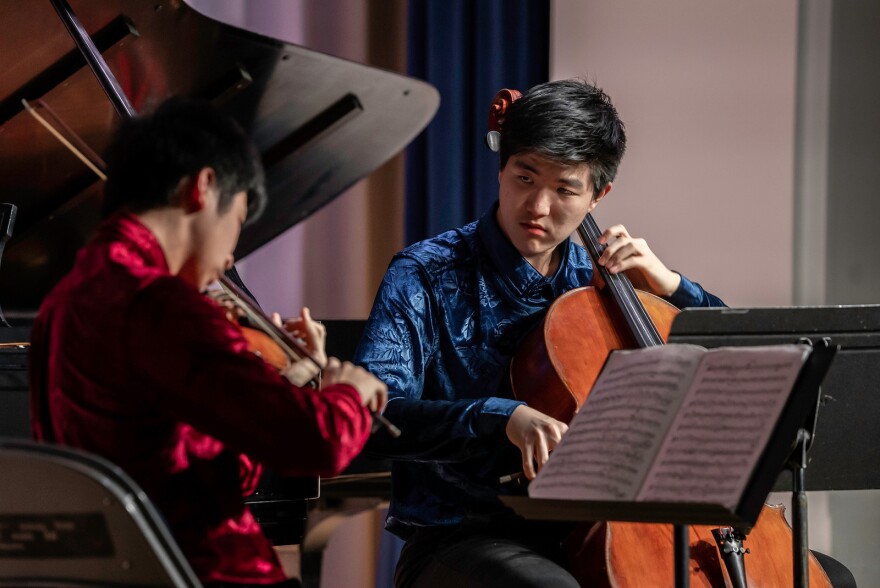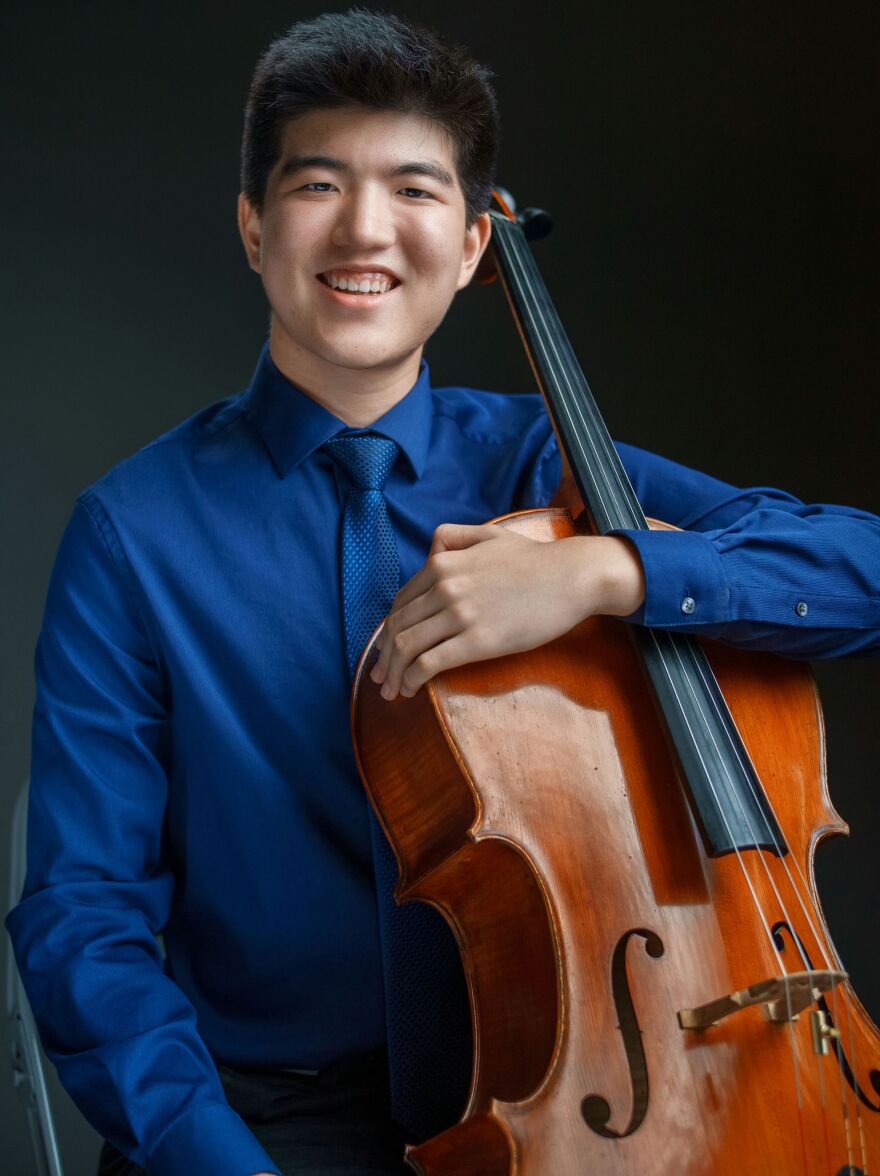Samuel Cao is a 17-year-old cellist from Philadelphia, PA. He started playing the cello at the age of 6, and he currently studies privately with Gloria dePasquale of the Philadelphia Orchestra. Samuel is the principal cellist of the Philadelphia Youth Orchestra, a full scholarship recipient of the Settlement Music School Advanced Study Chamber Music Program, and has been a member of the Philadelphia Music Alliance for the Youth (PMAY) Artists' Initiative since 2020.
Samuel was the winner of the 2024 Warminster Symphony Orchestra Young Artists Competition and the 2025 Rowan University String Ensemble Concerto Competition, performing as a soloist with both ensembles in the 2024-2025 season. As a member of the Myer Schwartz Piano Trio, he was a two-time semifinalist in the Fischoff National Chamber Music Competition and a finalist in the 2024 Coltman Chamber Music Competition. Additionally, Samuel was awarded the First Runner-Up award in the 2022 Philadelphia Young Artists’ Orchestra Concerto Competition and was the second-place finalist in the 2023 Bucks County Symphony Orchestra Concerto Competition.
Samuel has participated in prestigious summer music programs, including the Heifetz International Music Institute and the Domaine Forget International Music Festival, and has participated in masterclasses with renowned artists. Outside of music, Samuel enjoys debating competitively on the national high school circuit, supporting all of Philly’s sports teams, and playing chess.
10 Questions with Samuel Cao:
1. How would you describe the role of the cello in an orchestra?
If the entire string section of an orchestra had to be combined into one instrument, I think it’d be the cello. The cello’s sound can be powerful and dense, yet also sweet, warm, and airy. It has a large range, so it’s able to reach the violins’ soprano voice while still grounding the orchestra with a deep sound like the double bass. Composers often write lyrical melodic lines for the cello because of its rich tone, while also entrusting it with virtuosic passages. The cello’s sound blends very well with the other instruments in the orchestra, so it also often leads harmonic changes. One orchestral piece that I recently played that well demonstrates the cello’s range and versatile capabilities is Richard Strauss’ Ein Heldenleben. You’ll hear the cello from the very beginning!
2. What was one thing about your instrument that surprised you when you started learning to play?
I was immediately surprised by how challenging it was to properly hold the bow. Professional musicians make the bow hand look so relaxed and simple, but as a beginner, I felt like I'd drop it unless I gripped it as tight as possible. When I first started playing, I tried all sorts of tricks to get my bow grip sorted out, even temporarily trying out rubber elephant-shaped bow grips (yes, they’re a real thing). It took me years to understand how the bow naturally fits under my hand shape, and it’s something I’ll probably continue working on for my entire life.

3. What’s your favorite thing about Philadelphia?
Having lived in the city my entire life, I’ve been able to experience new cuisines, cultures, and ideas basically every day; Philly is the perfect size where it’s full of opportunity while not being overwhelmingly busy. I love following all of its sports teams, and Philly sports fans are some of the most passionate in the world. The fans have a tough love mentality, which I think represents the entire city well.
4. If you weren’t involved with music, what would you be doing?
I’d probably spend my time finding other ways to be creative, like starting long-term writing/research projects or working with friends to build things with Arduino and 3D printing.
5. What’s it like to be a leader in the Philadelphia Youth Orchestra?
I’ve made many great memories in my four years at PYO, and while 8:30 am Saturday rehearsals aren't always the easiest, they’re definitely rewarding. It always feels surreal and special to perform in the Kimmel Center’s Marian Anderson Hall. From a musical perspective, leading the cello section has pushed me to listen much more to the rest of the orchestra, opening my ears to what’s going on around me.

6. What advice would you give your 9-year-old self?
I would tell my 9-year-old self to continue pursuing the hobbies and interests I love to the fullest extent. When I was 9, I was obsessed with chess, spending whole weekends studying tactics and playing at tournaments. I also loved playing baseball with my friends and solving Rubik’s cubes. Looking back, I don’t regret a single minute I spent on these activities, and I’m very happy to have pursued them.
7. What are you currently reading?
Two books I’ve been reading (albeit at a relatively slow pace) are Why Nations Fail by Daron Acemoglu and James A. Robinson, and All the Light We Cannot See by Anthony Doerr. In English class, I’ve been reading Russ Shafer-Landau’s The Fundamentals of Ethics.
8. What type of ensembles do you enjoy playing in and why?
I love playing in small chamber ensembles, like string quartets and piano trios. I have the most experience with piano trios, and having a piano is a huge buff to the string sound. String quartets are also just so special; it’s beautiful when four string instruments are able to blend their sound and have a conversation.

9. Do you have any hidden talents?
Not sure if it counts as a talent, but I can type around 150 words per minute using just my left hand plus one index finger. I’ve also played over 1,000 games of 10-second hyperbullet chess against the same opponent, with around a 70% win rate.
10. What advice would you give to other people interested in learning the cello?
Go for it! My biggest advice when just starting out is to listen to as many recordings as you can. Listen, listen, listen. When I was 7, my first cello teacher gave me a six-CD album of Yo-Yo Ma performing great works for the cello repertoire, from the Elgar Concerto to Bach’s 6th Suite to the Vivaldi Double. I’ve probably listened to the album thousands of times.
Samuel's Recommended Playlist:


